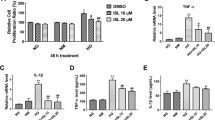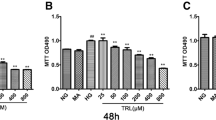Summary
The role of serum and glucocorticoid-induced kinase 1 (SGK1) pathway in the connective tissue growth factor (CTGF) expression was investigated in cultured human mesangial cells (HMCs) under high glucose. By using RT-PCR and Western blot, the effect of SGK1 on the CTGF expression in HMCs under high glucose was examined. Overexpression of active SGK1 in HMCs transfected with pIRES2-EGFP-S422D hSGK1 (SD) could increase the expression of phosphorylated SGK1 and CTGF as compared with HMCs groups transfected with pIRES2-EGFP (FP) under high glucose or normal glucose. Overexpression of inactive SGK1 in HMCs transfected with pIRES2-EGFP-K127N hSGK1 (KN) could decrease phosphorylated SGK1 and CTGF expression as compared with HMCs groups transfected with FP under high glucose. In conclusion, these results suggest that high glucose-induced CTGF expression is mediated through the active SGK1 in HMCs.
Similar content being viewed by others
References
Ritz E, Orth S R. Nephropathy in patients with type 2 diabetes mellitus. N Engl J Med, 1999,341(15):1127–1133
Lane P H, Steffes M W, Fioretto P et al. Renal interstitial expansion in insulin-dependent diabetes mellitus. Kidney Int, 1993,43(3):661–667
Wolf G, Ziyadeh F N. Molecular mechanisms of diabetic renal hypertrophy. Kidney Int, 1999,56(2):393–405
Gilbert R E, Cooper M E. The tubulointerstitium in progressive diabetic kidney disease: more than an aftermath of glomerular injury? Kidney Int, 1999,56(5):1627–1637
Stevens V A, Saad S, Chen X M et al. The interdependence of EGF-R and SGK-1 in fibronectin expression in primary kidney cortical fibroblast cells. Int J Biochem Cell Biol, 2007,39(5):1047–1054
Feng Y, Wang Q, Wang Y et al. SGK1-mediated fibronectin formation in diabetic nephropathy. Cell Physiol Biochem, 2005,16(4–6):237–244
Webster M K, Goya L, Ge Y et al. Characterization of sgk, a novel member of the serine/threonine protein kinase gene family which is transcriptionally induced by glucocorticoids and serum. Mol Cell Biol, 1993,13(4):2031–2040
Pearce D. SGK1 regulation of epithelial sodium transport. Cell Physiol Biochem, 2003,13(1):13–20
Verrey F, Loffing J, Zecevic M et al. SGK1: aldoster-one-induced relay of Na+ transport regulation in distal kidney nephron cells. Cell Physiol Biochem, 2003,13(1):21–28
Lang F, Klingel K, Wagner C A et al. Deranged transcriptional regulation of cell-volume-sensitive kinase hSGK in diabetic nephropathy. Proc Natl Acad Sci U S A, 2000,97(14):8157–8162
Friedrich B, Warntges S, Klingel K et al. Up-regulation of the human serum and glucocorticoid-dependent kinase 1 in glomerulonephritis. Kidney Blood Press Res, 2002,25(5):303–307
Waerntges S, Klingel K, Weigert C et al. Excessive transcription of the human serum and glucocorticoid dependent kinase hSGK1 in lung fibrosis. Cell Physiol Biochem, 2002,12(2–3):135–142
Fillon S, Klingel K, Warntges S et al. Expression of the serine/threonine kinase hSGK1 in chronic viral hepatitis. Cell Physiol Biochem, 2002,12(1):47–54
Wang Q S, Zhang X L, Wang Y M et al. High glucose stimulates synthesis of fibronectin in human mesangial cells via serum and glucocorticoid-induced protein kinase-1 signaling pathway. Natl Med J China (Chinese), 2005,85(23):1591–1595
Wang Q S, Zhang X L, Wang Y M et al. The significance and expression of serum and glucocorticoid-inducible kinase in kidney of diabetic nephropathy mice. J Huazhong Univ Sci Technol [Med Sci], 2005,25(02):170–173
Moussad E E, Brigstock D R. Connective tissue growth factor: what’s in a name? Mol Genet Metab, 2000,71(1–2):276–292
Ruperez M, Ruiz-Ortega M, Esteban V et al. Angiotensin II increases connective tissue growth factor in the kidney. Am J Pathol, 2003,163(5):1937–1947
Wang S, Denichilo M, Brubaker C et al. Connective tissue growth factor in tubulointerstitial injury of diabetic nephropathy. Kidney Int, 2001,60(1):96–105
Murphy M, Godson C, Cannon S et al. Suppression subtractive hybridization identifies high glucose levels as a stimulus for expression of connective tissue growth factor and other genes in human mesangial cells. J Biol Chem, 1999,274(9):5830–5834
Frazier K, Williams S, Kothapalli D et al. Stimulation of fibroblast cell growth, matrix production, and granulation tissue formation by connective tissue growth factor. J Invest Dermatol, 1996,107(3):404–411
Saad S, Stevens V A, Wassef L et al. High glucose transactivates the EGF receptor and up-regulates serum glucocorticoid kinase in the proximal tubule. Kidney Int, 2005,68(3):985–997
Wang X, Luo C, Liu J et al. Expression of serum and glucocorticoid-inducible kinase1 in diabetic rats and its modulation by fluvastatin. J Huazhong Univ Sci Technol [Med Sci], 2005,25(6):651–654
Vallon V, Wyatt A W, Klingel K et al. SGK1-dependent cardiac CTGF formation and fibrosis following DOCA treatment. J Mol Med, 2006,84(5):396–404
Author information
Authors and Affiliations
Corresponding author
Additional information
Quansheng WANG and Ali ZHANG contributed equally to the manuscript.
This project was supported by a grant from the National Natural Sciences Foundation of China (No. 30600810).
Rights and permissions
About this article
Cite this article
Wang, Q., Zhang, A., Li, R. et al. High glucose promotes the CTGF expression in human mesangial cells via serum and glucocorticoid-induced kinase 1 pathway. J. Huazhong Univ. Sci. Technol. [Med. Sci.] 28, 508–512 (2008). https://doi.org/10.1007/s11596-008-0504-z
Received:
Published:
Issue Date:
DOI: https://doi.org/10.1007/s11596-008-0504-z




